
Writing is perhaps the #1 cornerstone of becoming an authority.
It is also essential for SEO, social media and attracting the attention of journalists.
Despite that, many experts and business owners are wondering how to keep up with developing blog posts and content when they have so much else to do. Sound familiar?
Khaled Housseni, author of three New York Times best sellers, sums up the proper attitude of a writer by stating the obvious solution:
“I have met so many people who say they’ve got a book in them, but they’ve never written a word. To be a writer — this may seem trite, I realize — you have to actually write. You have to write every day, and you have to write whether you feel like it or not.”
In addition to procrastinating when I don’t feel like writing, I get distracted easily. Staying focused on writing can sometimes feel harder than climbing Mount Everest in fuzzy bunny slippers.
Perhaps you are wondering how to become a writer and also need a bit of help to keep things moving. This could even be a nudge to find a ghostwriter.
So for a little bit of inspiration, I am going to explore how often thought leading writers – and bloggers in particular – write. Just keep in mind that these are the best of the best and the main thing you need to take away is that you need to do it and to stick with it at any level.
The key is consistency, even if it is just writing one blog post a month.
You should also NEVER give up because success often shows up later than a stoned junior high school student.
- Neil Patel – Quick Sprout, Kiss Metrics and Crazy Egg
 Neil Patel is an outrageously prolific writer and CEO of at least 2 very successful companies. Below is his 2015 schedule:
Neil Patel is an outrageously prolific writer and CEO of at least 2 very successful companies. Below is his 2015 schedule:
“Here’s what a typical week looks like for me in terms of blog content alone:
- 2 posts on Quick Sprout (1,000-5,000 words each) plus an infographic
- 2 posts on the NeilPatel.com blog (about 5,000 words each)
- 2 guest posts on other popular blogs (about 1,500 words each)
- 5-1 blog post for the Crazy Egg blog (about 2 per month at about 2,000 words each)
Total that up, and you get around 17,000 words per week or 3,400 words per weekday.
And I’ve been able to sustain this type of volume for years.” Source
- Seth Godin – sethgodin.com
 Seth Godin is one of the world’s top bloggers and marketers. As you can see, his level of commitment is clear:
Seth Godin is one of the world’s top bloggers and marketers. As you can see, his level of commitment is clear:
“If you make the decision to blog every single day, then the only discussion I have to have with myself is what’s the best blog post I can write — not should I write a post. As (Saturday Night Live Producer) Lorne Michaels has said, ‘Saturday Night Live doesn’t go on because it’s ready. It goes on because it’s 11:30.’”
“Blogging every day clarifies my thoughts — it helps me notice things. It’s one of the most important practices of my profession.” Source 1
I’m America’s worst watcher of television, cause I don’t spend any time doing that, zero. And I’m America’s worst attender of meetings, cause I don’t do any of that, zero. So I know people who do five hours of each every day. So right there I save myself ten hours a day. Source 2
- Jon Morrow – smartblogger.com
 I’m kind of Jon Morrow obsessed right now and I am taking his blogging classes. Jon wrote a single post that got over a million views! Here’s how he got good:
I’m kind of Jon Morrow obsessed right now and I am taking his blogging classes. Jon wrote a single post that got over a million views! Here’s how he got good:
One of the unfortunate side effects of becoming a fancy-pants CEO is I have a lot less time to write than I used to. Where I used to spend 5-6 hours a day writing, I’m lucky if I get 1-2 now.
Is that extreme? Yes, I suppose, but I wanted to be the best.
Point to the top person in any field, and you’ll find someone who went to extremes to get where they are. So, I did too.
It’s no coincidence that’s when I created my best work.” Source 1
And “Every popular blogger I know reads at least one book every week and writes at least 1,000 words every day.” Source 2
- Chris Brogan – chrisbrogan.com
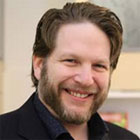 And here’s how Chris Brogan, one of team most famous social media experts of all time, originally built his writing muscles:
And here’s how Chris Brogan, one of team most famous social media experts of all time, originally built his writing muscles:
- I don’t watch TV.
- I don’t read blogs endlessly.
- I don’t wait in lines without doing two things at a time.
- I get up before my kids (if I can help it), and write while they’re at school.
- I don’t do phone calls or meetings if I can help it. If I have to, I keep them VERY brief.
- I’m trying out Dragon Dictate for the Mac (no review yet).
- I can type really really fast.
Not all of these will apply to you. Use as many angles as you can. It’s all about determination, habit, and repeat effort.”
- Dan Kennedy – dankennedy.com
 Dan is one of the highest paid copywriters in the world.
Dan is one of the highest paid copywriters in the world.
This is paraphrased from hearing him talk at the 2015 Authority Marketing Summit:
The Summit was broken into 2 days and two main topics, “writing yourself into existence” and public speaking, so it’s clear what tactics he sees as most critical.
Dan doesn’t check email or use the internet…
Call it extreme but it seems to work for him and I think you can see a clear time management trend developing across authors.
- Lee Odden – toprankblog.com
 Lee has been named #15 of top 100 online marketers and runs one of the top content marketing blogs in the word.
Lee has been named #15 of top 100 online marketers and runs one of the top content marketing blogs in the word.
I saw Lee at HubSpot’s Inbound conference in 2015 and he described how many blog posts he has written over the years.
I guess we have some catching up to do, according to this interview on Copyblogger…
I used to write all of the blog posts for our blog and still write the majority of them; so writing every day has been a necessity.” Source: Copyblogger
- Michael Hyatt – michaelhyatt.com
 Michael is famous for helping people understand they need a platform, like a blog and email list, if they want to sell more books and get more leads.
Michael is famous for helping people understand they need a platform, like a blog and email list, if they want to sell more books and get more leads.
In 2012 he said:
Blogging has established my authority and expertise. It used to be that you had to get a Ph.D. or write a book to establish your expertise in a subject area. While these are still valid paths, blogging provides a third alternative. For example, I do not have a degree in leadership nor have I written a book on that topic. Yet, I am constantly asked to speak on leadership and am interviewed by the media on this topic. Why? Because I have one of the most popular leadership blogs.” Source
- Ann Handley – Annhandley.com
 Ann co-founded ClickZ.com, is a best selling author, writes for Entrepreneur magazine, is Chief Content Officer at MarketingProfs and is a top 20 women blogger. Hardly a resume that comes from chilling on the couch.
Ann co-founded ClickZ.com, is a best selling author, writes for Entrepreneur magazine, is Chief Content Officer at MarketingProfs and is a top 20 women blogger. Hardly a resume that comes from chilling on the couch.
Ann says:
If I’m working on a project, I spend much of the weekend days writing, because I have a weekday job that keeps me pretty busy.” Source
- Jeff Goins – goinswriter.com
 Jeff built a blog of over 100,000 readers in two years and writes daily from faith and the heart.
Jeff built a blog of over 100,000 readers in two years and writes daily from faith and the heart.
Spending five hours on a Saturday writing isn’t nearly as valuable as spending 30 minutes a day every day of the week. Especially when you’re just getting started. The idea is repetition — developing a discipline of showing up, making this a priority, and working through The Resistance.
If you want to get this writing thing down, you need to start writing every day. No questions asked, no exceptions made. After all, this isn’t a hobby we’re talking about; it’s a discipline.” Source
To be honest, I have been more of a five hour Saturday writer lately and this quote just kicked my butt, as did the two times I did Jeff’s 30 post in 30 day challenge.
- Bryan Clark – copyblogger.com
 Bryan Clark, is CEO of Rainmaker Digital and founder of Copyblogger.
Bryan Clark, is CEO of Rainmaker Digital and founder of Copyblogger.
According to SEMrush, his blog has almost 60,000 keywords driving Google traffic to it.
He started off more aggressively and is now in the following routine, as can be seen in clips from an interview with Kelton Reid:
2-3 hours, minimum.
How many hours a day do you spend actually writing (excluding email, social media etc.)?
Depends on the day. Between one hour and six.” Source
Below are some quick quotes from and about writers that are not marketers, to get a variety of perspectives:
- R.R Tolkien
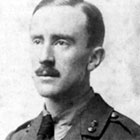 Some people write a novel in a few months and for others it takes over a decade of consistent writing.
Some people write a novel in a few months and for others it takes over a decade of consistent writing.
- Stephen King
 Stephen King writes 2,000 words a day and says:
Stephen King writes 2,000 words a day and says:
- Ernest Hemingway

- E.B. White

- Haruki Murakami

- Maya Angelou
 Maya Angelou shares her process:
Maya Angelou shares her process:
I go around 6:30 in the morning. I have a bedroom, with a bed, a table, and a bath. I have Roget’s Thesaurus, a dictionary, and the Bible.
I have all the paintings and any decoration taken out of the room. I ask the management and housekeeping not to enter the room, just in case I’ve thrown a piece of paper on the floor, I don’t want it discarded.
But I’ve never slept there, I’m usually out of there by 2. And then I go home and I read what I’ve written that morning, and I try to edit then. Clean it up.” Source
- William Faulkner

Conclusion
As an entrepreneur and CEO of a small business, I wear more hats than an intern at a circus, so I need systems and a routine.
When teaching others how to become a writer, Stephen King suggests committing to 2,000 words per day. Many others simply suggest writing with some type of regularity to form a habit.
One thing is for sure, most of us will benefit from developing a more consistent pattern.
In the days where most people ignore commercial advertising, having something genuinely helpful for potential customers may be the only way to stand out.
Without writing, no blog post, social post, book, infographic or content will ever be created.
How many hours a day or pages a week do you think it will take to make a difference to your bottom line and make you feel good?

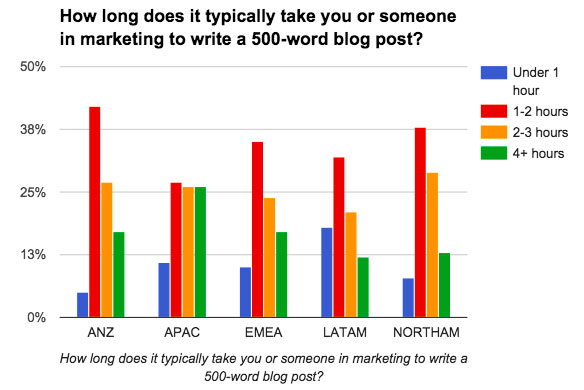
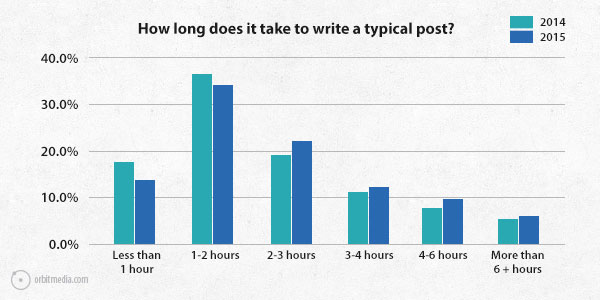
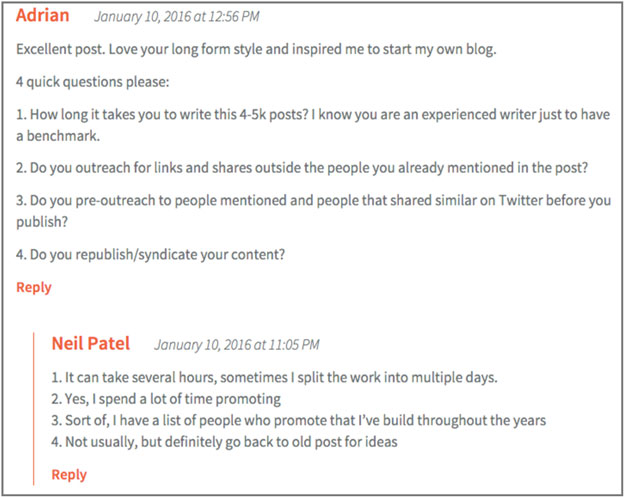
 Focus is the key:
Focus is the key: Buffer has over 700,000 visitors a month on their blog, so their writers are great to emulate. Kevin Lee says:
Buffer has over 700,000 visitors a month on their blog, so their writers are great to emulate. Kevin Lee says: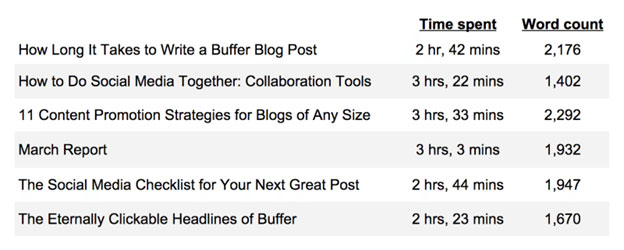
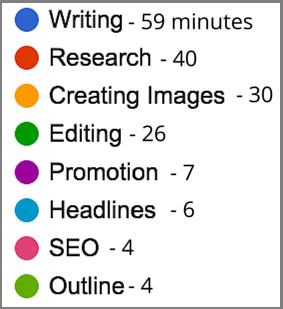
 Not everyone starts off writing fast, as you can see below.
Not everyone starts off writing fast, as you can see below. Danny is a master of guest posting and wrote 14 Posts and 17,481 Words in 6 Days:
Danny is a master of guest posting and wrote 14 Posts and 17,481 Words in 6 Days: Ramsay Taplin of The Blog Tyrant also spends a lot of time on just the headlines:
Ramsay Taplin of The Blog Tyrant also spends a lot of time on just the headlines: Kristi Hines, an amazing blogger and social media expert, writes in half day chunks, while tuning out email and social:
Kristi Hines, an amazing blogger and social media expert, writes in half day chunks, while tuning out email and social: Ginny Soskey from Hubspot shoots for a couple hours jamming to Pandora:
Ginny Soskey from Hubspot shoots for a couple hours jamming to Pandora: Meghan Keaney Anderson avoids taking all day on posts by avoiding rabbit holes:
Meghan Keaney Anderson avoids taking all day on posts by avoiding rabbit holes: Joel is clearly on a roll when writing 40 hour posts for top blogs:
Joel is clearly on a roll when writing 40 hour posts for top blogs: 2 hours apparently won’t cut it when you are a walking link magnet!
2 hours apparently won’t cut it when you are a walking link magnet! Vitaly Friedman of Smashing Magazine says:
Vitaly Friedman of Smashing Magazine says:



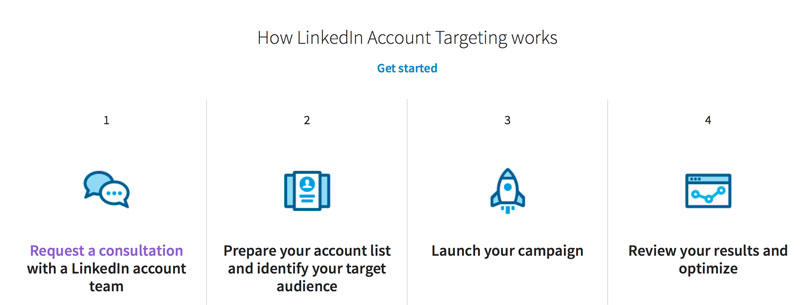

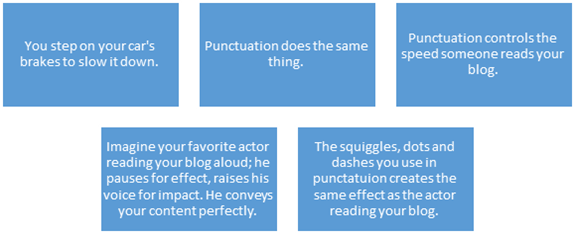
 You can’t figure out why your blog is a dud. People love the content; you spent days writing it. Spell check can’t find a single word to highlight in red. You proofread it five times. What’s wrong?
You can’t figure out why your blog is a dud. People love the content; you spent days writing it. Spell check can’t find a single word to highlight in red. You proofread it five times. What’s wrong?